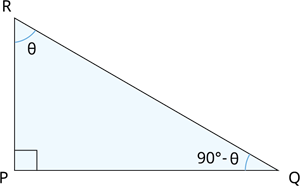PDF chapter test TRY NOW
Let us recall that if the sum of the two acute angles is 90^{\circ}, then the angles are said to be complementary.
In a right-angled triangle, the sum of two acute angles are 90^{\circ}.
That is, we can say that the two acute angles in a right-angled triangle are complementary.
Consider the triangle PQR right-angled at P.

Here R and Q are complementary angles.
Therefore if \angle R = \theta, then \angle Q = 90^{\circ} - \theta.
Let us write all the trigonometric ratios with respect to \angle R = \theta in a table.
Table 1:
Trigonometric ratio | Relationship with the \Delta PQR | Trigonometric ratio | Relationship with the \Delta PQR |
\sin \theta | \sin \theta = \frac{PQ}{RQ} | \text{cosec}\,\theta | \text{cosec}\,\theta = \frac{RQ}{PQ} |
\cos \theta | \cos \theta = \frac{PR}{RQ} | \sec \theta | \sec \theta = \frac{RQ}{PR} |
\tan \theta | \tan \theta = \frac{PQ}{PR} | \cot \theta | \cot \theta = \frac{PR}{PQ} |
Now let us write all the trigonometric ratios with respect to \angle Q = 90^{\circ} - \theta in a table.
Table 2:
Trigonometric ratio | Relationship with the \Delta PQR | Trigonometric ratio | Relationship with the \Delta PQR |
\sin (90^{\circ} - \theta) | \sin (90^{\circ} - \theta) = \frac{PR}{RQ} | \text{cosec}\,(90^{\circ} - \theta) | \text{cosec}\,(90^{\circ} - \theta) = \frac{RQ}{PR} |
\cos (90^{\circ} - \theta) | \cos (90^{\circ} - \theta) = \frac{PQ}{RQ} | \sec (90^{\circ} - \theta) | \sec (90^{\circ} - \theta) = \frac{RQ}{PQ} |
\tan (90^{\circ} - \theta) | \tan (90^{\circ} - \theta) = \frac{PR}{PQ} | \cot (90^{\circ} - \theta) | \cot (90^{\circ} - \theta) = \frac{PQ}{PR} |
Comparing the tables 1 and 2, we arrive at the following identities.
1. \sin \theta = \cos (90^{\circ} - \theta)
2. \cos \theta = \sin (90^{\circ} - \theta)
3. \tan \theta = \cot (90^{\circ} - \theta)
4. \text{cosec}\,\theta = \sec (90^{\circ} - \theta)
5. \sec \theta = \text{cosec}(90^{\circ} - \theta)
6. \cot \theta = \tan (90^{\circ} - \theta)
